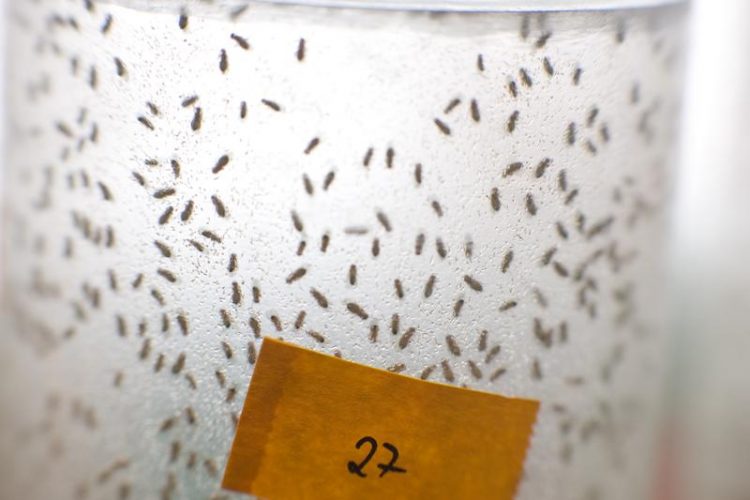Age-related decline in sleep quality might be reversible

The fruit fly Drosophila melanogaster has a life expectancy of about eight weeks and is one of the model organisms scientists at the MPI for Biology of Ageing use to uncover what happ Wolfgang Weiss for the Max Planck Institute for Biology of Ageing
To uncover basic age-related sleep mechanisms, the Max Planck scientists studied the fruit fly Drosophila melanogaster, a classical model organism in ageing research. „Drosophila’s sleep has many features in common with that of humans, including the decline in quality“, says Luke Tain of the MPI for Biology of Ageing.
„Like humans, flies sleep at night and are active during the day. We can observe when and how long flies sleep. We can also determine their sleep quality by measuring how often they wake. This allows us to study the effects of specific substances or other sleep-influencing factors such as age and genetic disposition.“
Ageing researchers Athanasios Metaxakis, Luke Tain, and Sebastian Grönke, in the department of MPI Director Linda Partridge, discovered that a reduced activity in the IIS signalling pathway leads to improved sleep quality at night and higher activity levels at day. A “signalling pathway” is a biological method of transferring information, and via those pathways, the cell can respond to external conditions like the state of food supply.
„In our study, we described the role of the IIS pathway in regulating sleep and activity through the neurotransmitters octopamine and dopamine“, explains Tain. „What makes this pathway so interesting to us is the fact that it is evolutionarily conserved. This means that its components and functions are similar in diverse species from simple organisms like fruit flies to mice and even humans. Furthermore, we were able to improve sleep quality by administering therapeutic agents.”
Moreover, the scientists found out that day activity and night sleep are regulated by two distinct signalling pathways, night sleep being mediated through TOR and dopaminergic signalling. Surprisingly, if TOR’s activity is acutely inhibited by treatment with the therapeutic agent Rapamycin, sleep quality improves even in old flies, suggesting that age-related sleep decline is not only preventable, but also reversible.
The scientists will follow up on their findings. Luke Tain: „Given the high evolutionarily conservation of IIS and TOR function, our results implicate potential therapeutic targets to improve sleep quality in humans. This would be our longer-term goal. The next step however, is to find out whether these mechanisms also work in higher animals like mice.“
Original publication:
Lowered Insulin Signalling Ameliorates Age-Related Sleep Fragmentation in Drosophila. Athanasios Metaxakis, Luke S. Tain, Sebastian Grönke, Oliver Hendrich, Yvonne Hinze, Ulrike Birras, and Linda Partridge. PLOS Biology, April 1, 2014.
Media Contact
All latest news from the category: Health and Medicine
This subject area encompasses research and studies in the field of human medicine.
Among the wide-ranging list of topics covered here are anesthesiology, anatomy, surgery, human genetics, hygiene and environmental medicine, internal medicine, neurology, pharmacology, physiology, urology and dental medicine.
Newest articles

Zap Energy achieves 37-million-degree temperatures in a compact device
New publication reports record electron temperatures for a small-scale, sheared-flow-stabilized Z-pinch fusion device. In the nine decades since humans first produced fusion reactions, only a few fusion technologies have demonstrated…

Innovative microscopy demystifies metabolism of Alzheimer’s
Researchers at UC San Diego have deployed state-of-the art imaging techniques to discover the metabolism driving Alzheimer’s disease; results suggest new treatment strategies. Alzheimer’s disease causes significant problems with memory,…

A cause of immunodeficiency identified
After stroke and heart attack: Every year, between 250,000 and 300,000 people in Germany suffer from a stroke or heart attack. These patients suffer immune disturbances and are very frequently…





















